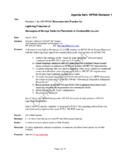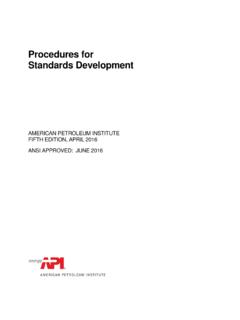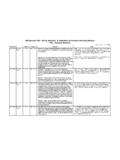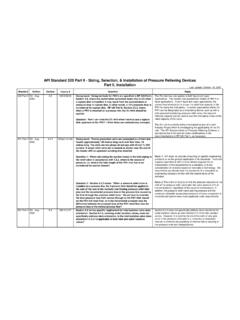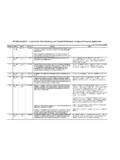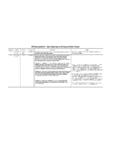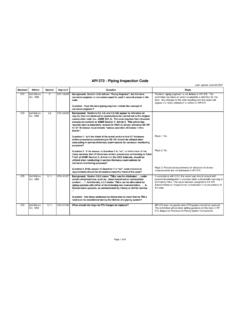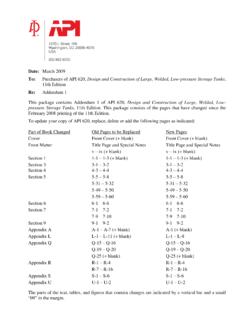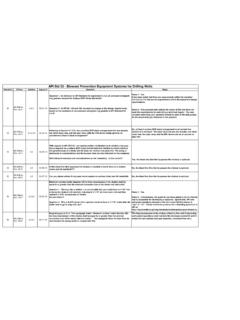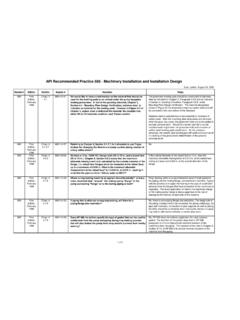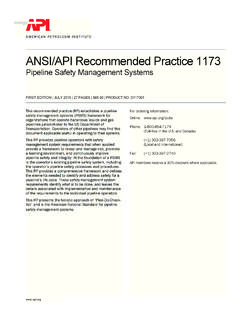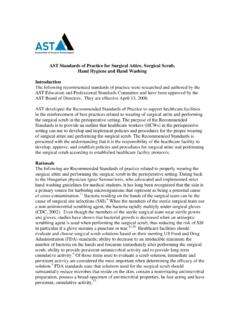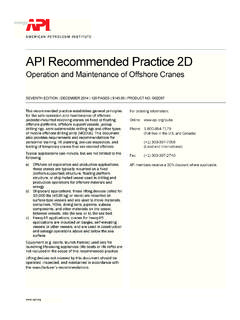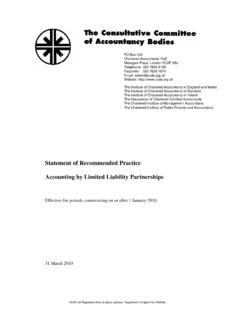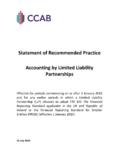Transcription of Public Awareness Programs for Pipeline Operators
1 Public Awareness Programs for Pipeline Operators API recommended PRACTICE 1162 FIRST EDITION, DECEMBER 2003 Public Awareness Programs for Pipeline Operators Pipeline Segment API recommended PRACTICE 1162 FIRST EDITION, DECEMBER 2003 SPECIAL NOTES API publications necessarily address problems of a general nature. With respect to partic-ular circumstances, local, state, and federal laws and regulations should be is not undertaking to meet the duties of employers, manufacturers, or suppliers towarn and properly train and equip their employees, and others exposed, concerning healthand safety risks and precautions, nor undertaking their obligations under local, state.
2 Or fed-eral concerning safety and health risks and proper precautions with respect to par-ticular materials and conditions should be obtained from the employer, the manufacturer orsupplier of that material, or the material safety data contained in any API publication is to be construed as granting any right, byimplication or otherwise, for the manufacture, sale, or use of any method, apparatus, or prod-uct covered by letters patent. Neither should anything contained in the publication be con-strued as insuring anyone against liability for infringement of letters , API standards are reviewed and revised, reaffirmed, or withdrawn at least everyfive years.
3 Sometimes a one-time extension of up to two years will be added to this reviewcycle. This publication will no longer be in effect five years after its publication date as anoperative API standard or, where an extension has been granted, upon republication. Statusof the publication can be ascertained from the API Standards department telephone (202)682-8000. A catalog of API publications, Programs and services is published annually andupdated biannually by API, and available through Global Engineering Documents, 15 Inv-erness Way East, M/S C303B, Englewood, CO 80112-5776.
4 This document was produced under API standardization procedures that ensure appropri-ate notification and participation in the developmental process and is designated as an APIstandard. Questions concerning the interpretation of the content of this standard or com-ments and questions concerning the procedures under which this standard was developedshould be directed in writing to the Director of the Standards department, American Petro-leum Institute, 1220 L Street, , Washington, 20005. Requests for permission toreproduce or translate all or any part of the material published herein should be addressed tothe Director, Business standards are published to facilitate the broad availability of proven, sound engineer-ing and operating practices .
5 These standards are not intended to obviate the need for apply-ing sound engineering judgment regarding when and where these standards should beutilized. The formulation and publication of API standards is not intended in any way toinhibit anyone from using any other manufacturer marking equipment or materials in conformance with the markingrequirements of an API standard is solely responsible for complying with all the applicablerequirements of that standard. API does not represent, warrant, or guarantee that such prod-ucts do in fact conform to the applicable API standard.
6 All rights reserved. No part of this work may be reproduced, stored in a retrieval system, or transmitted by any means, electronic, mechanical, photocopying, recording, or otherwise, without prior written permission from the publisher. Contact the Publisher, API Publishing Services, 1220 L Street, , Washington, 20005. Copyright 2003 American Petroleum Institute FOREWORD This document is a recommended Practice (RP) for Pipeline Operators to use in develop-ment and management of Public Awareness Programs . Pipeline Operators have conductedPublic Awareness Programs with the affected Public , government officials, emergencyresponders and excavators along their routes for many years.
7 The goal of this RP is to estab-lish guidelines for Operators on development, implementation, and evaluation of PublicAwareness Programs in an effort to raise the effectiveness of Public Awareness Programsthroughout the industry. Representatives from natural gas and liquid petroleum transmission companies, local dis-tribution companies, and gathering systems, together with the respective trade associations,have developed this recommended Practice. The working group was formed in early , representatives from federal and state Pipeline regulators have provided inputat each step of development and feedback from all interested parties has been solicitedthrough a wide variety of sources and publications may be used by anyone desiring to do so.
8 Every effort has been made bythe Institute to assure the accuracy and reliability of the data contained in them; however, theInstitute makes no representation, warranty, or guarantee in connection with this publicationand hereby expressly disclaims any liability or responsibility for loss or damage resultingfrom its use or for the violation of any federal, state, or municipal regulation with which thispublication may revisions are invited and should be submitted to API, Standards Department,1220 L Street, NW, Washington, DC 20005 iii CONTENTS Page 1 INTRODUCTION, SCOPE AND GLOSSARY OF TERMS.
9 Of Terms .. 22 Public Awareness PROGRAM DEVELOPMENT.. for Meeting Public Awareness Objectives .. Compliance .. Resources .. Support.. and Supplemental Public Awareness Programs .. Development Guide .. of Program Recommendations .. 103 STAKEHOLDER AUDIENCES .. Affected Public .. Officials.. Public Officials .. 184 MESSAGE CONTENT.. Purpose and Reliability .. Awareness and Prevention Measures .. Recognition and Response .. Preparedness Communications .. Prevention .. Location Information.
10 Consequence Areas (Hcas) and Integrity Management Program Overview for Transmission Operators .. on Operator Websites .. Encroachment Prevention .. Pipeline Maintenance Construction Activities .. Security .. Facility Purpose .. 215 MESSAGE DELIVERY METHODS AND/OR MEDIA .. Distribution of Print Materials .. Contact .. Communication Methods.. Media Communications .. Advertising Materials.. or Educational Items.. Marker Signs .. Center Outreach .. Websites .. 23 v Page 6 RECOMMENDATIONS FOR SUPPLEMENTAL ENHANCEMENTS OF BASELINE Public Awareness PROGRAM.
